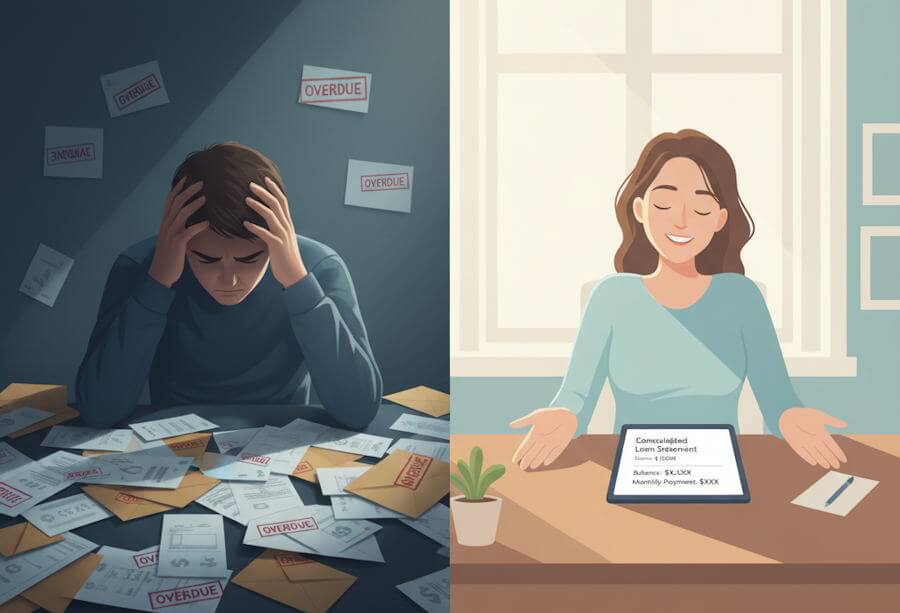Debt is something most of us carry at some point—whether it’s student loans, credit cards, or a car payment. Sometimes, juggling multiple bills with different due dates, interest rates, and minimum payments can feel overwhelming. That’s when people start looking into debt consolidation. On the surface, it sounds like a magic fix: combine everything into one monthly payment and breathe easier. But like most financial strategies, it has both benefits and drawbacks. Let’s walk through when it makes sense—and when it might actually set you back.
What Is Debt Consolidation?
Debt consolidation is the process of taking multiple debts and rolling them into a single loan or repayment plan. This could be done through a personal loan, a balance transfer credit card, or even a home equity loan. The goal is usually to simplify your financial life and ideally secure a lower interest rate.
When Debt Consolidation Helps
Consolidation can be a smart move in the right circumstances. If you’re currently paying sky-high interest rates on several credit cards, moving those balances into a lower-rate loan could save you hundreds (or even thousands) of dollars over time. You’ll also have the convenience of one due date instead of five.
- Lower Interest Rates: Especially helpful if you’re consolidating credit card debt.
- Simplified Payments: One bill to remember instead of many.
- Predictable Timeline: Loans often come with set payoff schedules.
For some people, consolidation can also be a fresh start psychologically. It’s easier to stay motivated when you see real progress each month rather than spreading payments thinly across multiple accounts.

When Debt Consolidation Hurts
The truth is, consolidation isn’t a cure-all. If your spending habits don’t change, you might pay off old credit cards only to start charging them up again. That’s how some people end up with more debt than before.
Another downside is that not all consolidation loans come with better terms. If your credit score is low, you may be offered high interest rates that cancel out any potential benefit. Some people also stretch repayment over a longer term, which lowers the monthly bill but increases the total cost of the loan.
| Pros | Cons |
|---|---|
| Lower interest rates | May extend repayment timeline |
| One simple monthly payment | Doesn’t fix poor spending habits |
| Can improve credit with timely payments | Not always available with bad credit |
| Reduces stress and confusion | Risk of ending up deeper in debt if misused |
How to Decide If It’s Right for You
The key question to ask yourself is this: Will debt consolidation actually reduce my total cost of borrowing? If the answer is yes, and you’re confident you won’t fall back into old habits, it can be a powerful tool. But if you’re only looking for a “quick fix” or a way to avoid facing the root cause of your debt, it could be a dangerous distraction.
It’s also important to remember that debt consolidation isn’t your only option. Depending on your situation, negotiating with creditors, enrolling in a debt management plan, or even exploring steps to take for a charged-off Affirm account could be more effective strategies for long-term stability.

Real-Life Example
Imagine Sarah, who has three credit cards totaling $15,000 in debt, with interest rates between 18% and 24%. Her monthly payments barely cover the interest. If she consolidates into a personal loan at 11% with a five-year repayment plan, she saves money, pays off her debt faster, and regains peace of mind. On the flip side, if her credit score is too low and she only qualifies for a loan at 19%, consolidation wouldn’t help her much at all.
Final Thoughts
Debt consolidation can be a valuable tool for the right person in the right circumstances. It can simplify repayment, save you money, and reduce stress. But it isn’t the perfect solution for everyone. If you’re considering it, run the numbers carefully and be honest with yourself about your financial habits. Sometimes the hardest part isn’t combining your debts—it’s changing the behaviors that led you there in the first place.
At the end of the day, consolidation is just one piece of the bigger financial puzzle. Used wisely, it can be a stepping stone toward freedom. Misused, it can become just another detour on the road to debt relief.
